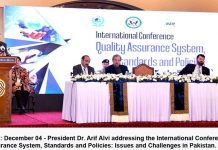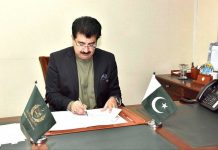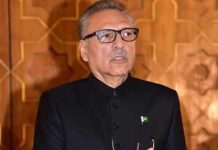 In a significant shift following the 2024 General Election, the Muhammad Shehbaz Sharif-led coalition government has garnered widespread admiration for its decisive role in averting Pakistan’s potential financial collapse.
In a significant shift following the 2024 General Election, the Muhammad Shehbaz Sharif-led coalition government has garnered widespread admiration for its decisive role in averting Pakistan’s potential financial collapse.
The government’s strategic and financial moves, including securing vital agreements with the IMF and diplomatic support, have proven crucial in stabilizing the country’s economy during a time of the acute financial crisis in early months of 2022.
“At the time of Prime Minister Shehbaz Sharif’s government assuming office in April 2022, Pakistan was on the verge of defaulting on its international debt obligations, with foreign reserves dwindling to critically low levels besides current accounts deficit was mounting,” said Professor Dr Zilakat Malik, former Chairman, Economics Department at University of Peshawar while talking to APP.
He said the country was desperate for immediate financial relief and long-term economic stability at that time. Through a combination of tough fiscal policies and strategic international diplomacy, he said the government has been able to put the country’s economy back on track, reducing the current account deficit and restoring international confidence.
He reiterated that if the Shehbaz Sharif government had not made tough fiscal decisions at that time, the likely default would have had disastrous effects on the nation’s credit rating, leading to runaway inflation, mass unemployment, and social unrest.
Under the leadership of Shehbaz Sharif, key economic indicators have shown significant improvement. The government’s efforts have led to an increase in exports, which reached about $30.64 billion from $27.72 billion, along with a record inflow of remittances from overseas Pakistanis.
The other notable initiatives included the launch of the Uran Pakistan mega project for economic sustainability and youth empowerment, implementation of universal health coverage, and the inauguration of the new Gwadar airport.
The government’s fiscal reforms have also led to significant positive outcomes for economic recovery, with Pakistan saving Rs238 billion after suspending the costly agreement with Independent Power Producers (IPPs). Moreover, the improvement in the country’s credit rating was also considered major achievement.
Addressing Pakistan’s longstanding energy shortfall, the government has converted about 27,000 electric tube wells to solar energy, which is expected to enhance agricultural production while reducing power consumption.
“The reduction of inflation to record lows, coupled with the stock exchange reaching new heights and the increase of BISP stipends to Rs13,500, have directly benefited millions of Pakistanis,” said Dr. Zilakat Malik.
Former Ambassador Manzoorul Haq said that the pivotal moment in averting Pakistan’s economic default came with the government’s focused diplomatic efforts and strengthened its bilateral relations with friendly countries.
He said the Prime Minister Shehbaz Sharif led successful diplomatic policies and negotiations with the International Monetary Fund (IMF), securing a vital loan package that included foreign exchange reserves helped to stabilize the Currency and restored confidence of international monetary institutions.
The government also engaged with regional partners such as Saudi Arabia, China, and the UAE, securing essential financial relief to support infrastructure development, poverty allievation, industrial and infrastructure development besides job creation.
In addition to securing the much needed financial aid, he said the government has sucessfully implemented vital tax reforms and rationalized subsidies, focusing on increasing revenue collection and cutting non-essential public sector expenditures.
These measures have helped stabilize the national economy and bridge urban-rural gaps, while efforts to curb smuggling and improve the business climate have positioned the country for speedy growth.
PML-N KP Information Secretary Ikhtair Wali emphasized the importance of these reforms, ensuring that the country does not face such a precarious economic situation again.
He accused the PTI Government’s poor fiscal policies that put the country’s at the verge of economic default.
“The measures we have taken are not just for short-term stabilization but also for long-term sustainable growth that was praised by international monetary institutions,” he stated.
Former Ambassador Manzoorul Haq praised the Shehbaz Sharif government’s foreign policy achievements, particularly the successful organization of the Shanghai Cooperation Organization (SCO) conference in Islamabad.
He also highlighted the strong stance the Prime Minister took at the United Nations General Assembly on the Kashmir dispute, restoring international confidence in Pakistan.
Several prominent figures, including retired information officer Misal Khan, senior economist Sumbal Riaz, and property dealer Nasir Khan, have also lauded the government’s 11 months performance, which they say has raised the country’s stature on the global stage.
Despite the remaining economic challenges, such as inflation, unemployment, and debt burden, experts believe the government’s swift action has provided the country with a crucial window of opportunity for economic recovery vital for jobs creation and ensuring daily use items to people at a reasonable rate.
With foreign reserves stabilized and fiscal policies starting to bear fruits, Pakistan is now in a better position to attract much-needed international investment.
Experts remain optimistic about the future of Pakistani economy, pointing to the government’s successful prevention of imminent economic default as a testament to the nation resilience and hope for sustainable growth.
The road ahead may still be fraught with challenges, but Pakistan’s quick recovery from a near-collapse represents a critical turning point and provides a solid foundation for the nation’s long-term prosperity.












